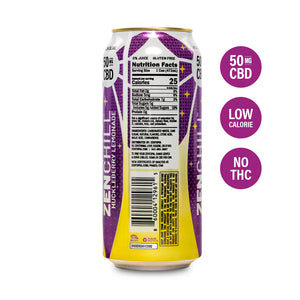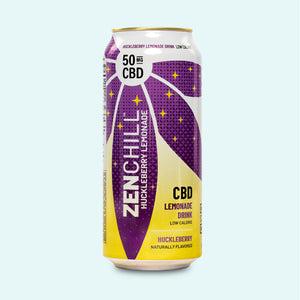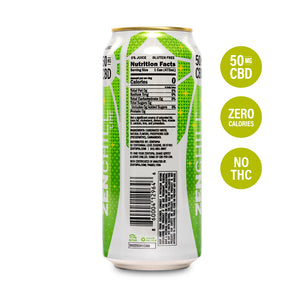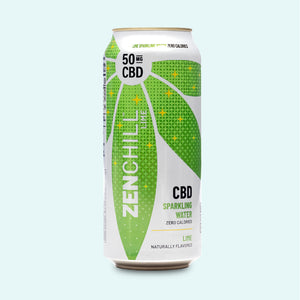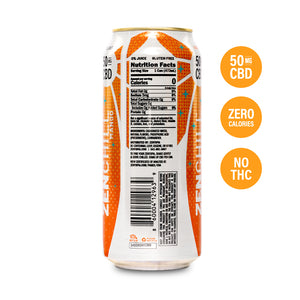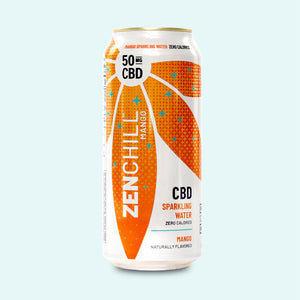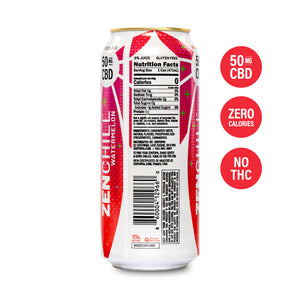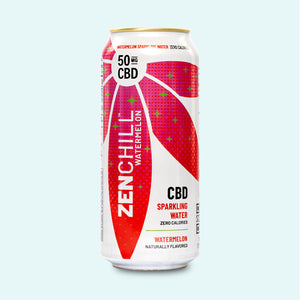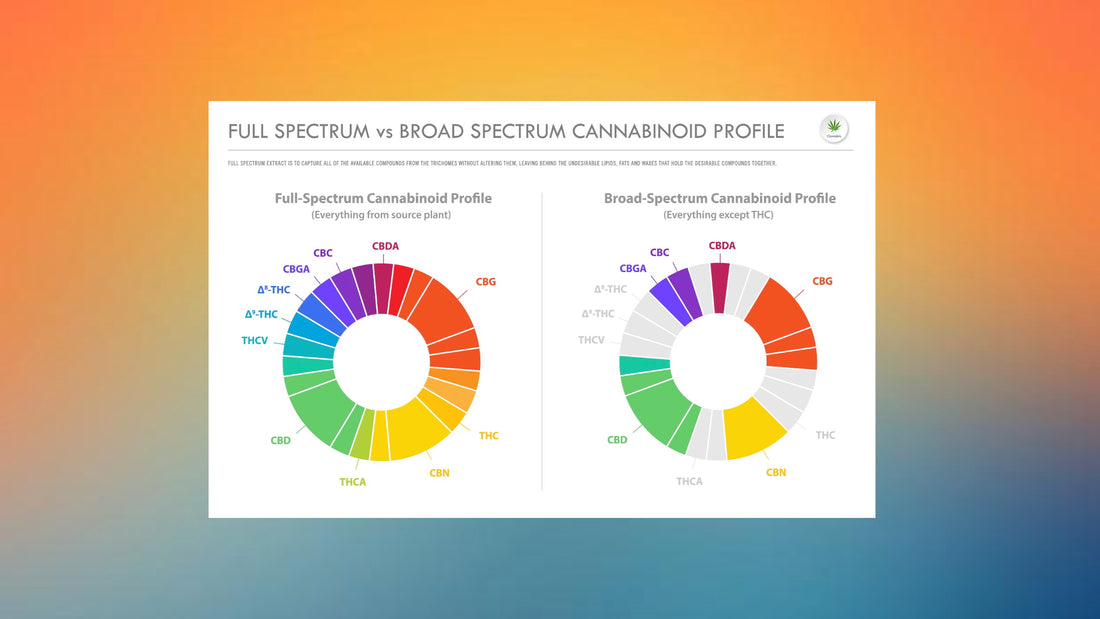
Full-Spectrum CBD vs. Broad-Spectrum CBD: What’s the Difference and Which Is Right for You?
CBD products have taken the wellness world by storm, offering solutions for everything from stress relief to pain management. But when it comes to choosing the right type of CBD, you’ve likely encountered the terms Full-Spectrum CBD and Broad-Spectrum CBD.
What exactly do these terms mean? Why does it matter? In this comprehensive guide, we’ll break down the differences between Full-Spectrum and Broad-Spectrum CBD, explore their benefits, and help you determine which one might be the best fit for your needs.
What Is CBD and Why Is It Popular?
Understanding CBD
CBD (cannabidiol) is one of over 100 naturally occurring compounds found in the cannabis plant. Unlike THC (tetrahydrocannabinol), the compound responsible for the "high" associated with marijuana, CBD is non-psychoactive. This means it won’t alter your state of mind, but it can have significant benefits for your body and mind.
CBD interacts with the body’s endocannabinoid system (ECS), which helps regulate functions like sleep, mood, immune response, and pain sensation. This is why so many people turn to CBD for relief from various health issues, including anxiety, insomnia, and chronic pain.
Why CBD Has Become So Popular
The rise in CBD's popularity is tied to its potential health benefits. Here are a few reasons why people are gravitating toward CBD:
- Stress relief: CBD is known to promote relaxation without the sedative effects of THC.
- Pain management: Studies have shown that CBD may reduce inflammation and help with chronic pain.
- Improved sleep: By reducing anxiety and promoting relaxation, CBD can improve sleep quality.
- Non-psychoactive: Since CBD doesn’t get you high, it’s more widely accepted and legal in many places where THC isn’t.
The wellness industry has embraced CBD, leading to an array of products, from tinctures and topicals to Full-Spectrum CBD and Broad-Spectrum CBD beverages.
Full-Spectrum CBD: What You Need to Know
What is Full-Spectrum CBD?
Full-Spectrum CBD refers to CBD products that contain the full range of cannabinoids, terpenes, and other beneficial compounds found in the hemp plant. These compounds work together in what’s known as the entourage effect to amplify the therapeutic benefits of each other.
How Full-Spectrum CBD is Made
The process of creating Full-Spectrum CBD involves extracting CBD from the hemp plant, along with small amounts of other cannabinoids (like CBG, CBN, and THC), terpenes, and flavonoids. This results in a rich cannabinoid profile that offers a well-rounded experience.
Benefits of Full-Spectrum CBD
- Enhanced therapeutic effects: Thanks to the entourage effect, Full-Spectrum CBD may be more effective than CBD isolate at treating certain conditions.
- Contains all natural plant compounds: You'll benefit from the plant’s full range of cannabinoids and terpenes.
- Mild THC presence: While there’s typically less than 0.3% THC in Full-Spectrum products, some people prefer the inclusion of THC for additional benefits like pain relief or sleep support.
Who Should Consider Full-Spectrum CBD?
If you’re looking for a holistic CBD experience and don’t mind trace amounts of THC, Full-Spectrum CBD might be the right choice. It’s especially beneficial for those seeking help with chronic pain, anxiety, or sleep disorders.
The Entourage Effect Explained
What Is the Entourage Effect?
The entourage effect refers to the way cannabinoids and terpenes work together to enhance the therapeutic effects of CBD. When these compounds interact, they create a synergistic relationship, making the overall product more effective than the sum of its parts.
How the Entourage Effect Works
In Full-Spectrum CBD, the presence of THC, along with minor cannabinoids like CBG (cannabigerol) and CBN (cannabinol), can boost CBD's effects. For example, some research suggests that the combination of CBD and THC is more effective at reducing pain than either compound on its own. But
Why the Entourage Effect Matters
The entourage effect is one of the main reasons people choose Full-Spectrum CBD over other types. The full range of cannabinoids and terpenes works together to provide a more comprehensive therapeutic experience, particularly for conditions like chronic pain, inflammation, and anxiety.
Broad-Spectrum CBD: What Sets It Apart?
What is Broad-Spectrum CBD?
Broad-Spectrum CBD is very similar to Full-Spectrum CBD, with one major difference: it contains zero THC. This makes it a great option for people who want the benefits of the entourage effect but don’t want to consume any THC, either for personal reasons or because of drug testing concerns.
How Broad-Spectrum CBD is Made
To create Broad-Spectrum CBD, manufacturers remove all THC during the extraction process, while still retaining other cannabinoids like CBG and CBN and beneficial terpenes.
Benefits of Broad-Spectrum CBD
- No THC: If you're concerned about consuming THC or passing a drug test, Broad-Spectrum CBD offers peace of mind.
- Entourage effect without THC: You still benefit from the synergistic interaction between CBD, cannabinoids, and terpenes.
- Ideal for sensitive individuals: Those who are sensitive to THC or live in areas where THC is strictly regulated may prefer Broad-Spectrum CBD.
Who Should Consider Broad-Spectrum CBD?
If you want the potential benefits of Full-Spectrum CBD but can’t (or prefer not to) have any THC in your system, Broad-Spectrum CBD is an excellent option. It’s great for people who need to avoid THC for work-related drug tests or those who live in areas with stricter THC regulations.
Key Differences Between Full-Spectrum and Broad-Spectrum CBD
|
Feature |
Full-Spectrum CBD |
Broad-Spectrum CBD |
|
Cannabinoid Content |
Contains all cannabinoids, including THC |
Contains all cannabinoids except THC |
|
THC Content |
Less than 0.3% THC |
0% THC |
|
Entourage Effect |
Yes, includes THC in the entourage effect |
Yes, but without THC in the entourage effect |
|
Ideal For |
People comfortable with trace THC |
Those needing THC-free products |
Effects and Benefits
- Full-Spectrum CBD: provides the full entourage effect, which may enhance the effectiveness of the product, especially for conditions like chronic pain or severe anxiety.
- Broad-Spectrum CBD: offers a similar range of benefits but without the risk of consuming THC.
THC Presence
The primary difference comes down to THC. Full-Spectrum CBD contains trace amounts of THC, which may show up on drug tests, while Broad-Spectrum CBD is completely THC-free, making it safer for people subject to drug screenings.
Which Type of CBD Is Right for You?
Personal Preferences
When choosing between Full-Spectrum CBD and Broad-Spectrum CBD, consider the following factors:
- THC tolerance: If you're comfortable with trace amounts of THC and want the full entourage effect, Full-Spectrum may be for you.
- Drug testing: If you need to avoid THC altogether, Broad-Spectrum is the way to go.
- Effectiveness: Some find Full-Spectrum products more effective due to the THC content, but others prefer the clean feeling of Broad-Spectrum CBD.
Legal Considerations
In some areas, THC (even trace amounts) is heavily regulated. If you live in a state or country where THC laws are strict, Broad-Spectrum CBD could be a safer, more compliant option.
Common Misconceptions About Full-Spectrum and Broad-Spectrum CBD
Myth 1: Full-Spectrum CBD Will Get You High
The Facts: Full-Spectrum CBD contains only trace amounts of THC (less than 0.3%), which is not enough to cause any psychoactive effects.
Myth 2: Broad-Spectrum CBD Is Weaker
The Facts: While Broad-Spectrum CBD lacks THC, it still contains a rich blend of cannabinoids and terpenes that provide significant benefits, just without the THC.
Myth 3: You Need High Doses to Feel Effects
The Facts: It's not about the amount of CBD you consume, but about finding the right dose for your body. Start small and increase gradually to find the right dose for your needs.
How to Find High-Quality Full-Spectrum and Broad-Spectrum CBD Products
When shopping for CBD products, keep an eye out for these indicators of quality:
- Third-party lab testing: Always choose products that are tested by independent labs for purity and cannabinoid content.
- Clear labeling: Make sure the product clearly states whether it’s Full-Spectrum or Broad-Spectrum and how much CBD is in each serving.
- Organic and natural ingredients: Opt for products made with organic hemp and free from harmful additives.
At Zentopia all of our CBD drinks are tested by an independent third-party lab and we publish the Certificates of Analysis (COA) for every batch
Frequently Asked Questions (FAQ)
Can Full-Spectrum CBD Make Me Fail a Drug Test?
Yes, it’s possible, though unlikely. If you are concerned about drug tests, opt for Broad-Spectrum CBD instead. Also make sure to check the product label to ensure there is no traces of THC.
Is Broad-Spectrum CBD Less Effective Than Full-Spectrum?
Not necessarily. It depends on your personal response and whether THC is important for achieving the desired effects.
How Much CBD Should I Take?
Start with a small dose (10-20mg) and gradually increase until you find what works best for you.
Conclusion
Both Full-Spectrum CBD and Broad-Spectrum CBD offer significant benefits, but the right choice depends on your needs and lifestyle. Full-Spectrum is ideal for those who want the full entourage effect and don’t mind trace amounts of THC, while Broad-Spectrum is perfect for those who need or prefer a THC-free product.
Wherever you are in your CBD journey, make sure you choose high-quality products from reputable brands. Looking to explore your options? Check out Zentopia’s range of good-for-you, feel-good drinks, including CBD sparkling waters, teas, and lemonades to help you relax and rejuvenate.


